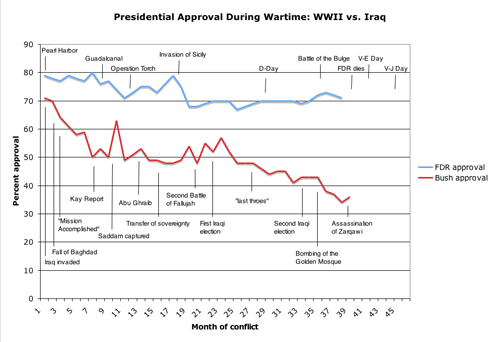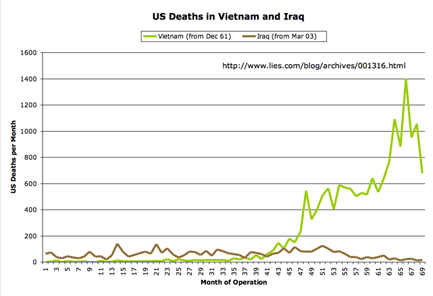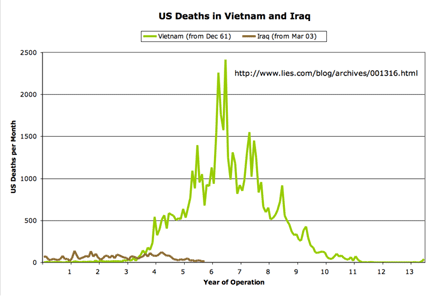I’ve been criticized for comparing the monthly death toll of US soldiers in Iraq and Vietnam. But of course, I’m not the only one who makes questionable comparisons between different wars.
Take the Bush team’s habit of trotting out comparisons to World War II whenever they’re feeling particularly defensive about Iraq. The latest example was on June 18, when Tony Snow said the following to Wolf Blitzer:
The president understands people’s impatience — not impatience but how a war can wear on a nation. He understands that. If somebody had taken a poll in the Battle of the Bulge, I dare say people would have said, ‘Wow, my goodness, what are we doing here?’ But you cannot conduct a war based on polls.
Joshua Marshall had some interesting comments on that (It’s a minor point…), and he followed up with a graphic showing the results of secret opinion polling conducted during World War II (Okay, back on Monday…).
But of course, Snow wasn’t making a serious argument about whether a president should try to direct a war based on polling data. What Snow was really doing was trying to foster a subconcious idea that our current situation in Iraq is analogous to the situation the Allies faced during the Battle of the Bulge, and that Bush’s leadership is analogous to that of FDR.
Which makes a certain limited sort of sense, at least at first glance. At this point, the Iraq war has been going on just about as long as US involvement in World War II had at that point. So in recognition of that, I prepared the following (click image for a larger version):

A few notes:
- For the FDR numbers, I used the Hadley Cantril graph provided by Josh Marshall, doing my best to estimate the monthly values of the “per cent approving way F.D.R. handling his job” line.
- For the Bush numbers, I used Gallup, as given at PollingReport.com, in each case choosing the poll number closest to the end of the calendar month.
I know from past experience that people won’t bother to read this, but for the record, I hereby stipulate that Iraq is a very different sort of war than World War II. More than 400,000 US soldiers died during WWII; during the same span of time about 2,500 have died in Iraq. But hey; it wasn’t my comparison. It was Snow’s.
Joshua Marshall already made this point, but I think the annotated timeline of the two wars makes it clearer. Bush is in nothing like the position FDR was during the Battle of the Bulge. At that point in WWII, the Allies were closing in on the Axis from all sides, with growing superiority in every area of the conflict and the only real question being whether the end would come soon (in the sense of a few months) or not quite so soon (in the sense of a few months later).
I suppose you could argue that a technological breakthrough could have turned the tide; nuclear-tipped V2s, or rocket fighters that gave the Luftwaffe overhwelming air superiority. But knowing what we know today, that wasn’t really in the cards, and in terms of the way the war was actually playing out, it was very much the endgame. And people recognized that; they’d been following the course of the war, and they knew they were winning.
Iraq is completely different. Outside the pro-Bush spin zone, there’s real doubt about how things are going to turn out, and Bush’s approval numbers reflect that. For my money, it looks more and more likely that we will end up leaving Iraq with our tail between our legs, with the best option we can hope for being the restoration of a Saddam-style dictator hostile to al Qaeda who will be able to prevent the place from serving as a breeding ground for Islamist terror.
Which, in case you weren’t paying attention, is more or less what we already had several hundred billion dollars and several thousand soldiers’ lives ago.
In the face of this catastrophe, Bush has no plan beyond “stay the course.” He would rather keep grinding soldiers into hamburger than admit his policies have failed, and he’s just going to leave it up to his replacement to figure out a solution, avoiding accountability by arguing that talk of withdrawal would embolden the insurgency, and hiding behind the (selectively filtered) judgement of military leaders.
From Bush’s March 21, 2006, press conference:
Q Will there come a day — and I’m not asking you when, not asking for a timetable — will there come a day when there will be no more American forces in Iraq?
THE PRESIDENT: That, of course, is an objective, and that will be decided by future Presidents and future governments of Iraq.
Q So it won’t happen on your watch?
THE PRESIDENT: You mean a complete withdrawal? That’s a timetable. I can only tell you that I will make decisions on force levels based upon what the commanders on the ground say.



